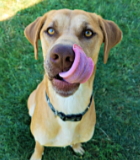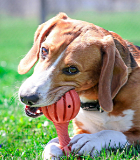Understanding the Nature of Typical Dog Behavior
- This topic has 0 replies, 1 voice, and was last updated 16 years, 3 months ago by
Mackenzie’s Admin.
-
AuthorPosts
-
March 6, 2009 at 5:51 pm #375
Mackenzie’s Admin
MemberWhen you understand the natural basis for your dog’s behavior, you can more easily learn to modify it.
UNDERSTANDING THE NATURE OF TYPICAL DOG BEHAVIOR
By Liam Crowe
CEO and Master Dog Behavioral Therapist
Bark Busters USADogs will be dogs. That’s an important message for all dog lovers. While some behaviors we humans would classify as “bad” are natural, they do not have to be part of the normal routine. Let’s face it. Some of the things dogs do drive us crazy. And yet, digging, chewing and jumping all come naturally to dogs.
Let’s look at some examples and the origin of the behavior.
Jumping begins as play behavior among puppies. They jump on and wrestle each other to prepare themselves for adult life when they’ll have to figure out their place in the pack. While most people think that a dog is saying hello when he jumps up, he’s actually demonstrating his dominance. The dog is saying that the house is his and that he is making the rules—or, he may be challenging you to “play” for leadership.
Barking is a natural form of dog communication. In a pack consisting of only dogs, however, there is usually very little barking. But in human-canine packs—our families—barking can happen all too often. Why? Primarily because we humans are not as perceptive to other forms of canine communications. We tend to miss the more subtle messages from our dogs, so they learn that people “need” to hear barks to respond.
Answering the front door is another natural behavior. The front door represents the entry to your dog’s den, and he’s inquisitive about who or what is there and what’s happening. This doesn’t mean that barking and pushing should be tolerated. If you can’t have a conversation with a delivery person, or welcome a guest into your home, you as the pack leader need to set boundaries. When dogs are allowed to make decisions for us (as in how to greet visitors), it undermines your authority as pack leader – and typically causes disarray or embarrassment.
Mouthing and nipping, like jumping, are behaviors that puppies learn as part of play—which is one reason dogs are designed with thick, loose skin that can handle a few nips and nibbles. Pups usually learn bite inhibition from the reactions of their littermates or from older dogs. Unfortunately, people often don’t convey the message clearly that nipping is inappropriate. Many of our reactions unintentionally encourage more nipping.
Coprophagia, or eating feces, is absolutely disgusting to people. Even so, it is a natural dog behavior. There are two good reasons for it. First, a mother dog will stimulate her very young puppies to toilet by licking their genital and anal areas. When they go, she consumes the excrement in order to keep the nest area clean. This is a puppy’s first exposure to the behavior. Secondly, dogs who persist in the habit may find some nutritional benefit, either from undigested food or from the bacteria that are present.
These and many other natural dog behaviors are triggered by instinct, so dogs don’t understand that there is any thing wrong with them. They aren’t doing them to make us mad – although that is often the result.
When you understand the natural basis for your dog’s behavior, you can more easily learn to modify it.
Dogs learn through experience and association. Additionally, dogs learn through a number of processes, operant conditioning, classical conditioning, inference and imitation are chief among them. The most effective training tactics take advantage of all of these learning processes in a dog-friendly way. Ask your local trainer for more details. With some conditioning, you can eliminate or minimize some of the behaviors you find undesirable – and your dog will still have that charming personality you love.
-
AuthorPosts
- You must be logged in to reply to this topic.












































